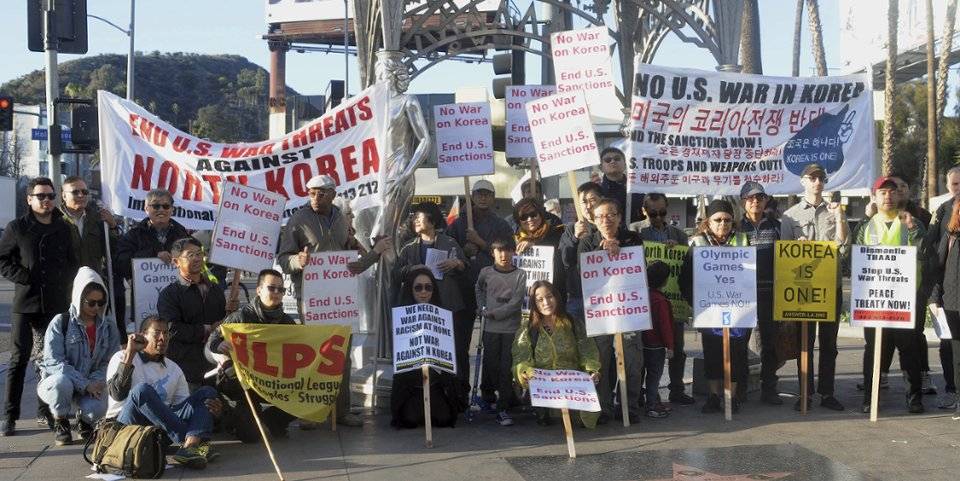

Los Angeles
Meetings, literature distributions and demonstrations occurred around the U.S. to protest the continuing escalation of war threats by the Trump administration against the Democratic People’s Republic of Korea. Here are reports about some of them.
Organizations in Los Angeles gathered at a military recruiting station on March 4 to protest U.S. threats against the DPRK and demand no new U.S. war games on the Korean peninsula.
The protest began at the CNN building, with chants demanding the withdrawal of all U.S. troops in south Korea along with U.S. THAAD (Terminal High Altitude Area Defense) missiles.
Activists spoke about the Olympics held in south Korea as showcasing the desire for peace by the people of north and south Korea, while exposing the belligerence of the U.S. in trying to sabotage peace prospects.
“We gather in the wake of the Olympics, which coincided with calls of support for the Korean women’s joint ice hockey team, a united Korea marching under a united Korean flag, and reconvening of high-level talks between delegations from the divided peninsula,” said William Ree from the Korean Peace Alliance who, along with Bev Tang from the International League of Peoples’ Struggle, emceed the event.
Rebecka Jackson of the International Action Center said, “These recent attacks by the U.S. are part of a long history of destabilization. This is a struggle of indigenous people resisting U.S. imperialism and exploitation.”
Bev Tang spoke about the frustration of the U.S. at the Winter Olympics and the answer to it: “Immediately after the closing of the Olympics, Trump announced ‘the heaviest sanctions ever imposed on a country.’”
Organizations participating in the march included the Korean American National Coordinating Council; Los Angeles Corean Progressive JINBO Network; Nanum Corean Cultural Center; Korea Peace Alliance; Answer; Koreatown Immigrant Workers Alliance; Workers World Party; International League of Peoples’ Struggle; International Action Center; and BAYAN SoCal.
Resisting criminal sanctions
A Philadelphia meeting Feb. 27 featured Hyun Lee, editor of ZoominKorea, and Deirdre Griswold, editor of Workers World newspaper.
Lee gave a remarkable PowerPoint presentation on economic and scientific developments in the DPRK that allow its population to withstand criminal U.S. sanctions. After a massive project to build tunnels, dams and canals to control waterways in the country’s mountainous terrain, the DPRK is now able to grow enough food for its people and does so with much lower electrical usage.
Combined with military advances in nuclear weapons that act as a necessary deterrent and allow the DPRK to defend itself from U.S. attack, the DPRK leadership is directing more attention to reunification with South Korea.
Griswold gave a historical overview of the 150-year attempt by U.S. imperialists to control and exploit Korea. In July 1866, the General Sherman, a U.S. Merchant Marine ship, was stopped and burned in the Taedong River by Korean patriots. Griswold stressed that the unending spirit of refusal to accept foreign domination continues to this day against Trump’s aggression.
The event was organized by the Philadelphia International Action Center and Workers World and was endorsed by International Concerned Family & Friends of Mumia Abu-Jamal; Comité Boricua Filadelfia-Camden; and Philadelphia Committee for Peace and Justice in Asia.
Activists in New York City went to Pennsylvania Station the evening of March 2 to give out factsheets on Korea and issues of Workers World with the headline “Unite to say ‘No war on Korea.’” They began to give out materials inside the station, but the cops pushed them outside. There, they braved strong winds and snow to reach out to workers.
At the Solidarity Center that night, a meeting featured Soobok Kim from Veterans For Peace, New Jersey. Soobok, who has been to the DPRK five times, showed photos and videos of everyday life, from parks to impressive architectural structures.
The presentation also covered the inspirational ways in which the DPRK has been able to apply science and technology to create solutions and alternatives in order to work around the unjust sanctions placed on them. The audience was captivated by the strength of the Korean people and the possibilities they present of what a better world holds in store for us all.
Demonstrators gathered in downtown Detroit during the busy 5 p.m. rush hour on March 2. An activist distributed Workers World newspapers to passersby while saying, “The people of Korea are marching together for peace, but Trump wants a nuclear war. We don’t need another war!” He reported that 90 percent of the people responded with “That’s right,” “No, we don’t” or “I agree.” Not one person said they supported a war with the DPRK.
WWP members in Chicago did street outreach on March 4 at the landmark “Bean” sculpture and at public transit stations, giving people facts about Korea and opposing Trump’s dangerous drive to nuclear war.
Activists contributing to this article included Christian Cobb, Kris Balderas Hamel, Andy Katz, John Parker and Joe Piette.
The following are highlights from a speech given by Yemen’s Ansarallah Commander Sayyed Abdul-Malik Badr…
Panamá Beluche is a sociologist, professor and anti-imperialist organizer in Panamá, writing here about the…
Download the PDF Farmworkers organize three-day strike Palestinian factions demand an end to the famine…
In the more than 650 days since the Al-Aqsa Flood (October 7, 2023), a remarkable…
Special to Workers World Hosted by Panda Aid (China) and co-organized by the International Action…
The following statement summaries were posted July 18, 2025, on Resistance News Network. Palestinian factions…